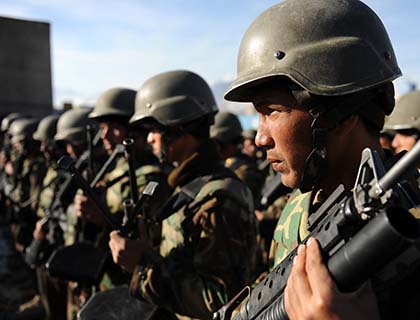Nowadays every other analysis and opinion piece on op-ed pages by Western media pundits increasingly talk of Afghanistan returning to civil war after the bulk of NATO and US troops' withdrawal in 2014. They express concerns about the fragile tribal atmosphere and fear fragmentation of Afghan National Security Forces along ethnic lines once Western troops pull out.
However, political stability is prime factor to determine reliability on strength, will and integration of security forces, and continuation of the current democratic process. Security challenges are secondary threats for larger instability and eventual chaos. Our history tells whenever there has been bloodshed that has led to crisis; it has been caused by political instability, not the traditional domestic security challenges to the writ of state, which has always been existent.
One legacy of the Karzai Administration is the factional and ethnic rivalries in security institutions. What is of greater concern is increasing politicization of security institutions, and attempts to use them for domestic political agendas of staying in power.
The sophisticated Taliban insurgency will remain the biggest threat. But factors that can lead to quick fragmentation of ANSF after NATO withdrawal will not be primarily the fact that there will be increasing number of suicide attacks in Kabul and other cities and insurgency will grow deadlier. However, unconstitutional attempts for power grab can cause our quick descent into chaos. Political transition in 2014 is equally important in parallel with full security transition to Afghan forces after NATO troops leave Afghanistan in 2014.
The international community, particularly Washington should pay attention to the preparations for a peaceful and transparent power transition in 2014. Political opposition groups express serious concerns regarding President Karzai's pledges to ensure legitimate transfer of power. Though he has repeatedly promised he will not make attempts to remain in power, as constitution does not allow, but domestically few take those commitments serious.
An election campaign has already been launched in the Presidential Palace, and meetings are held for bargaining. If President Karzai attempts to manipulate constitution to change the conditions for two-term limit in Presidential office, it will mean our descent into chaos. Domestically, there are preparations and uncertainties about the 2014 polls. It is clear that without strong support—financial, technical, and political and security—from the international community, it would be impossible for Afghanistan to hold peaceful elections for a smooth transition of power. But political opposition groups fear the Karzai Administration intends to use all state-resources and institutions in favor of their designs for the coming polls.
Only a transparent elections and legitimate transfer of power can ensure political stability and continuation of the post-Taliban democratic process. Any attempt by the current Palace dwellers to clench to power will mean violent episodes of power grab and eventual civil war. The international community must ensure peaceful transition of power strengthening our fragile and infant democratic process.
Washington must pay heed to the concerns of Afghan political opposition forces. The recent calls for restoration of credibility to the electoral process are being ignored by the Karzai Administration. The international community must make sure that a free, fair, transparent and independent election is held in 2014.
The new US Ambassador for Kabul James B Cunningham has said the coming Presidential election in 2014 is crucial for stability in Afghanistan. While testifying before the Senate Foreign Relations Committee, he said the international community has key role in ensuring smooth transfer of power in Afghanistan in 2014. He further said, "Key to Afghanistan's future stability will be a credible and inclusive presidential election in 2014, followed by a constitutional transfer of power. President Karzai has repeatedly affirmed his commitment to a peaceful, constitutional transition of power at the end of his second term. All Afghans, whatever their gender, ethnicity or religion, have much to gain from a successful political transition, and the United States is committed to working with international partners to support the Afghans as they choose their next leader."
Similar views were expressed by Senator John Kerry, Chairman of the Congressional committee. He said that the US must start planning for the 2014 elections "now" to ensure that responsibility for the nation's security gets transferred to a legitimate government.
He said, "Ultimately, it is the political transition that will determine whether our military gains are sustainable and the strength and quality of the Afghan state we leave behind will be determined by that political transition. It is critical that Afghans must pick their leaders freely and fairly. But we should make clear that we will only support a technical process that is transparent and credible. Selection of an accountable Independent Election Commission, transparency in new elections laws, and early preparation of voter lists are all critical steps for Afghans in order that they have a voice and choice in the election."

